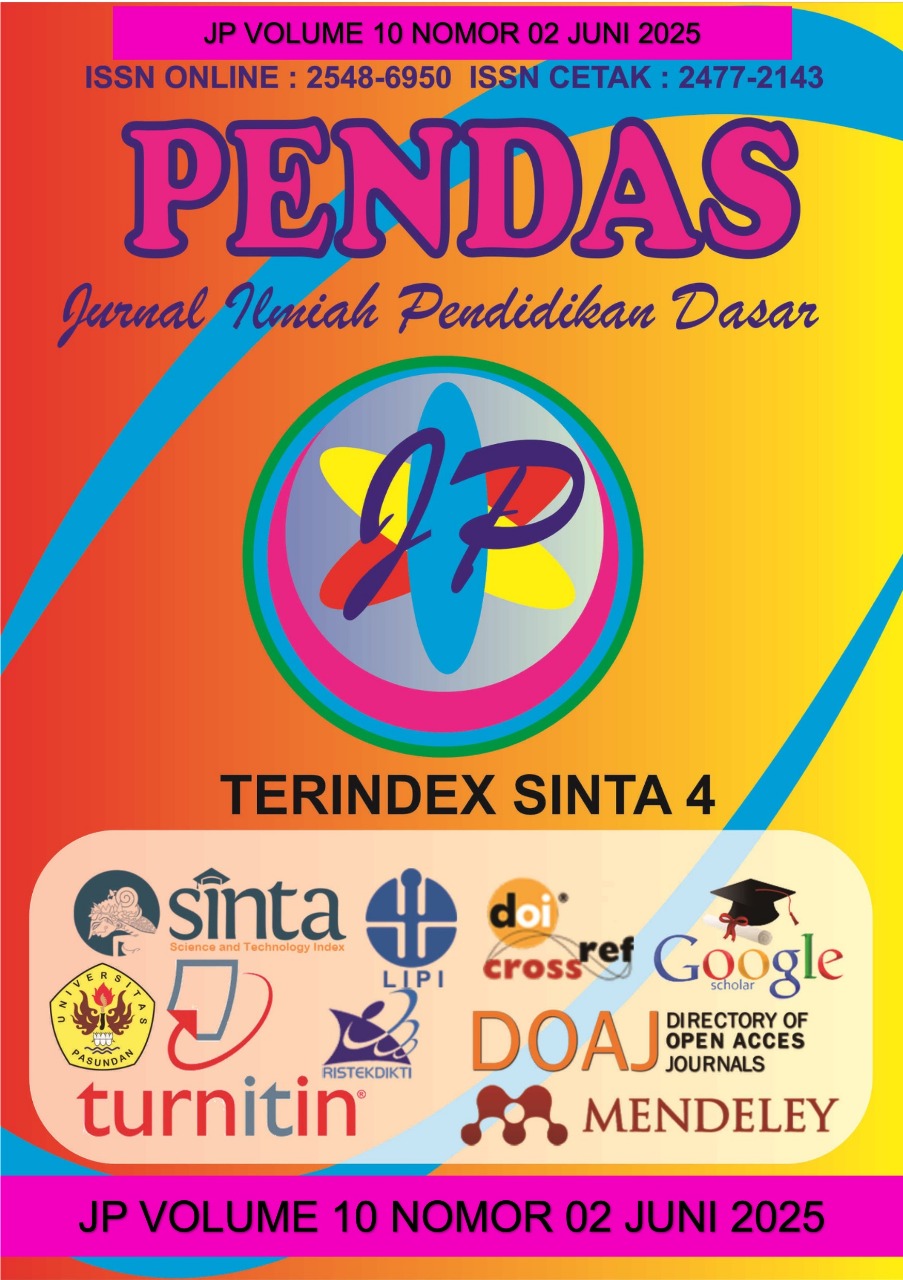PENERAPAN MODEL PEMBELAJARAN ROLE PLAYING UNTUK MENINGKATKAN PERCAYA DIRI DAN HASIL BELAJAR SISWA MATA PELAJARAN PENDIDIKAN PANCASILA KELAS IV SEKOLAH DASAR
DOI:
https://doi.org/10.23969/jp.v10i2.24047Keywords:
Role-Playing learning model, learning outcomes, self-confidenceAbstract
This research is based on a statement from the Minister of Education, Culture, Research, and Technology, Nadiem Anwar Makarim, who said that Indonesian children are experiencing a crisis of self-confidence. Likewise, students of SDN 3 Dadap showed a lack of self-confidence, especially in grade IV, this impacts their Pancasila Education scores, where 19 out of 21 students scored below the KKM, or around 90% of students are below the KKM score standard. This is because the learning model teachers use still uses conventional learning models and lecture approaches. One of the solution steps taken is to replace the learning model currently used with the Role-Playing learning model. This study aims to determine the application of the Role-Playing learning model, to increase student learning outcomes in the Pancasila Education subject, and to increase the self-confidence of grade IV students of UPTD SDN 3 Dadap by implementing the Role-Playing learning model. The research model used is Classroom Action Research (CAR) with 3 cycles using the Kemmis and McTaggart design models consisting of four steps, namely: planning, implementation, observation, and reflection. This research was applied to 21 fourth-grade students. The learning outcomes of students obtained during the implementation of the action increased, as seen from the results of cycle III, as many as 18 students completed with an average score of 80 and a percentage of 85%. Likewise, the level of student confidence increased in each cycle. Based on the results of the study, shows that the role-playing learning model can improve the learning outcomes and self-confidence of elementary school students.
Downloads
References
Agustin, D. N., Saputro, B. A., &
Poncowati, L. (2024). Peningkatan
Hasil Belajar melalui Metode Role
Playing pada Materi Hak dan
Kewajiban Kelas III SD Negeri
Wonotingal. Jurnal Pendidikan
Tambusai, 8(1), 15192–15198.
Aini, N., & Nurdyansyah, N. (2020).
Penerapan Metode Bermain Peran
pada Mata Pelajaran Bahasa
Indonesia Kelas 2 Sekolah Dasar.
366
Indonesian Journal of Education
Methods Development. 9, 9–11.
Alika, R. (2019). Nadiem: Anak
Indonesia Krisis Percaya Diri,
Butuh Manajemen Talenta.
Katadata.Co.Id.
https://katadata.co.id/amp/yuliawati
/berita/5e9a4c3d72f5d/nadiem-
anak-indonesia-krisis-percaya-diri-
butuh-manajemen-talenta?page=2
Anggraeni, S. D., Mutiah, A.,
Ardiningrum, D. I., & Wijayanti, O.
(2024). Role Playing dalam
Pembelajaran Drama untuk
Menumbuhkan Rasa Percaya Diri
Siswa Sekolah Dasar. Edukatif :
Jurnal Ilmu Pendidikan, 6(1), 788–
798.
https://doi.org/10.31004/edukatif.v6
i1.6166
Arikunto, S., Suhardjono, & Supardi.
(2017). Penelitian Tindakan Kelas
(Suryani (ed.); 2nd ed.). Bumi
Aksara.
Deeng, L. R., Katuuk, D. A., &
Tumurang, H. J. (2021). Penerapan
Model Pembelajaran Role Playing
Untuk Meningkatkan Hasil Belajar
Bahasa Indonesia di Kelas V SD
GMIM V Tomohon. Jurnal
Pendidikan Dasar, 2(2), 1–13.
Maulidiyah, Y., Mubarok, K., &
Rahmawati, E. (2022). Pengaruh
Metode Role Playing Terhadap
Hasil Belajar Subtema Pekerjaan di
Sekitarku Siswa Kelas IV SD.
Jurnal Ilmiah Mandala Education
(JIME), 8(1), 606–615.
jime.v8i1.2754/
http://ejournal.mandalanursa.org/in
dex.php/JIME
Downloads
Published
Issue
Section
License
Copyright (c) 2025 Pendas : Jurnal Ilmiah Pendidikan Dasar

This work is licensed under a Creative Commons Attribution 4.0 International License.














































